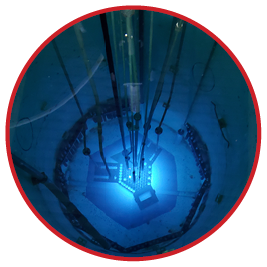Nuclear Engineering Minor
The only undergraduate nuclear program available in the state of Utah, and one of fewer than 50 nuclear engineering programs in the United States, students completing this minor take classes in nuclear principles, radiation interactions, radiochemistry, and nuclear science.
Benefits of having a Nuclear Engineering Minor include:
- Become more competitive when applying to a nuclear graduate program.
- Diversify job options beyond your current BS degree.
- Learn how to enter the growing fields of nuclear power, nuclear medicine, and nuclear forensics.
- Become competitively placed to join the Naval Nuclear Propulsion Officer Candidate (NUPOC) Program.
State-of-the-Art Labs: About Our Nuclear Reactor
The University of Utah is one of the few institutions in the nation that houses its own nuclear reactor, right here on campus. We've been conducting research and training on the TRIGA reactor since 1975. TRIGA stands for Training, Research, Isotopes General Atomics. There are currently only 35 TRIGA reactors operating in the world, with 17 in the United States.
In 2020, a new reactor console was implemented with grants from the Department of Energy. The major modification greatly improved the reactors capabilities.

Program Criteria
Students in any discipline may declare the minor if they have met the following required prerequisites:
- Cumulative GPA of 2.85 or higher
- C- or better in CHEM 1220 or CHEM 1221
- C- or better in MATH 1220 or MATH 1320 or MATH 1321
- C- or better in PHYS 2220, or CVEEN 2010, or ME EN 2010.
To fulfill the requirements of the minor, students must complete the 16 credits of coursework listed below with a GPA of 2.50 or higher:
Students must also maintain a cumulative GPA of 2.50 or higher to remain in good standing in the minor.
The 6 credits of nuclear-related technical electives may include NUCL 6000/7000-level courses* or nuclear-related courses from a student’s home department.
Minor Requirements
Nuclear principles in engineering and science will introduce students to fundamental concepts in nuclear engineering. Students will study the basics of nuclear energetics, radioactive decay, and radiation doses and hazards. The basic concepts will be used to introduce applications of nuclear technology including power, weapons, and medicine.
Radiation interactions will provide the students with a fundamental understanding of basic principles of radiation interactions with matter. These fundamental principles will then be applied to the life-cycle of neutrons in a reactor and the detection of radiation.
Radiochemistry will introduce students to the fundamental models of the atom and a detailed understanding of nuclear structure. Fundamentals of radioactive decay, radiation interactions and radiation detection will be discussed. In addition, students will the learn the fundamentals of isotope production through reactors, accelerators and in stars.
In the Nuclear Laboratory, students will gain hands-on experience studying the fundamental interactions and detection of radionuclides. In addition, students will gain an introduction to science using the TRIGA reactor including: neutron activation analysis and methods for determining the profile of thermal flux in a reactor.
Students have the option of using 6 credits of approved nuclear-related technical electives from their home department, making it possible to complete the nuclear engineering minor with only 10 additional credits beyond a engineering, math or science-related undergraduate degree.
Available Graduate Level UNEP Courses
This course will cover the theory and operation of our TRIGA reactor. Students will be taught the U.S. NRC 10CFR code and other associated regulatory policies and rules. With practical experiences through the experimental procedures involving our TRIGA. This course will provide students with the opportunity to learn how to operate the research reactor. Successful completion of the course will enable students to pursue the Research Operator exam for operation of our TRIGA reactor.
Graduate Radiation Interactions This course will provide students with a fundamental understanding of basic principles covering the modern theory of the atomic and nucleus structure, quantum description of nuclear processes, interactions of radiation with matter, and radioactive decay. Special emphasis will be placed on understanding the scattering and attenuation of neutrons, photons, and charge particles.
Graduate Radiochemistry will teach students the fundamental properties of the actinides applied to the nuclear fuel cycle. Students will learn techniques ranging from the extraction of uranium from ores, to the production of materials for power reactors, to the long term storage of nuclear waste
This course will provide students with an overview of cross sections and fission processes to build a comprehensive understanding of reactor physics and its application to reactor design. The main focus of this course will be on the theory of reactor steady-state (normal) operation. Methods of neutron transport modeling will be explained: diffusion, method of characteristics, finite difference method, Sn, Pn. Some aspects of the reactor kinetics will be also introduced.
* In order to take any NUCL 6000-level or higher class, an undergraduate student must have instructor approval, meet class prerequisites, and have a cumulative GPA of 3.2 or higher.

